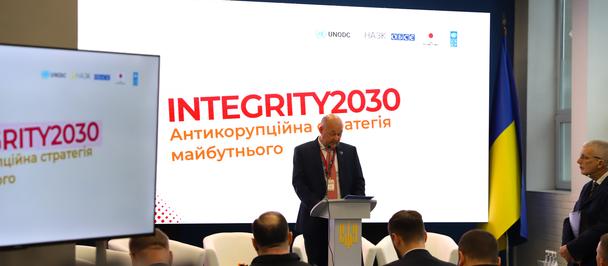With support from UNDP and the Government of Japan, judiciary, government and human rights organization representatives discussed how to integrate mediation principles for minors accused of crimes.
Experts in Kyiv discuss strategy for implementing restorative justice in the context of European integration
June 30, 2025

Kyiv, 25 June 2025 — A national roundtable titled “Legal Policy and Strategy for Implementing Restorative Justice through the Free Legal Aid System in the Context of European Integration” was held in Kyiv. The event was organized by the Interagency Coordination Council on Juvenile Justice (ICC) in cooperation with the Legal Aid Coordination Centre, with the support of UNDP in Ukraine and the Government of Japan.
Restorative justice is an approach that allows juvenile offenders to reconcile with victims, compensate for damages caused, and restore social ties with society. This approach equally protects the rights of both victims and juveniles who have committed criminal offences.
During the event, participants from government agencies, lawyers, mediators, and experts discussed the implementation of the State Programme of Restorative Justice for minors accused or suspected of committing criminal offenses.
The round table was attended by Deputy Minister of Justice of Ukraine Oleksandr Banchuk and the management of the Legal Aid Coordination Centre.
“The Roadmap on the Rule of Law, which is a comprehensive strategic document defining a set of reforms within the framework of the negotiation process on Ukraine's membership in the EU, addresses the issue of the legislative regulation of restorative justice, reintegration, and resocialisation of minors. Therefore, we have a rather ambitious goal – by the end of this year, to have a law that fully takes into account and regulates restorative justice approaches. To do this, we need to understand what gaps, advantages and disadvantages we have, which in turn will allow us to understand what we need to include in the draft of the new law.” — said Oleksandr Banchuk.
In this context, Svitlana Kolyshko, UNDP in Ukraine Human Rights and Access to Justice Project Manager, added that the introduction of restorative justice is part of a broader process of national recovery, where fairness and humanity become part of the legal system at all levels, bringing Ukraine closer to international standards of justice.
“The number of offenses committed by minors has increased during the war,” Kolyshko said. “According to the Fourth Rapid Damage and Needs Assessment (RDNA4), 79% of young people have been negatively affected by the war since February 2022. Justice must, above all, restore fairness and be guided by common sense. Restorative justice should become the standard model that promotes recovery, reintegration and the protection of children's rights in criminal proceedings.”
This event was also the culmination of a series of regional round tables that were conducted throughout 2024-2025 on the results of the implementation of the programme. Regional round tables were held in 22 regions of Ukraine, and involved over 3,000 participants – including investigators, judges, mediators, and lawyers from the free legal aid system.
During the national round table, participants discussed the current status of the Restorative Justice Programme, the challenges and prospects for its implementation, ways to strengthen mediation practices, and the development of a strategic action plan and further legal reforms in the context of European integration.
Background:
Since 2021, UNDP in Ukraine has been providing comprehensive support to the free legal aid system to enhance its institutional capacity to implement alternative dispute resolution methods and restorative justice, particularly for vulnerable groups, through free legal aid centres across Ukraine at the national and local levels.
Media Enquiries:
Yuliia Samus, UNDP Ukraine Head of Communications; e-mail: yuliia.samus@undp.org

 Locations
Locations



